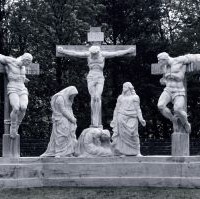The concept of our all existing as created beings, made in the Image of God, has been relegated to the trash heap of Enlightenment thinking. In a perverse social outgrowth of godless thinking–even in Darwin’s survival of the fittest–if someone sees a person deemed to have inherent worth, it’s usually because the assessor has developed sympathies. What do these sympathies arise from? As Darwin stated, “the social instincts lead an animal to take pleasure in the society of its fellows, to feel a certain amount of sympathy with them, and to perform various services for them.” This is the god of utility revealed. Whose pleasure? Whose sympathy? Who does various services for others because of how it makes who feel? It all revolves around oneself.
Altruism? Philanthropy? Even these ultimately come back to the utility the assessor attributes to another…unless one holds a biblical view.
We cannot be surprised at preferential treatment or discrimination when God has been removed from both the original design and ongoing plan for those made in His image. Once we have denied God as Creator, all of us who are made in His image no longer are seen to bear anything but a human imprint. It’s hard to see the Image of God if you deny God exists.
What exactly is the Image of God?
And why should seeing it be the most important Social Justice issue of our day?
The Imago Dei, the Image of God, is the intangible quality of humanity that separates human beings from the rest of the Animal Kingdom. Humans alone bear God’s fingerprints in our moral capacity to perform functions such as worship, reason, invent, and live within a divinely created moral framework. This moral framework–outlined in the Bible–coheres a human being to the Image of God and results in our loving God and loving our neighbors. This treatment of others arises out of a moral core (the content of our character) not a utility mindset.
 At the fall of man, the Image of God was broken but not lost. The vestiges of such a glorious image still shine forth in every human being, clouded by plenty of sin to be sure, but it is the Image of God that gives each person value and worth. The worth God has assigned is not determined by something so very superficial as skin color or even in our biological DNA. It’s soul deep.
At the fall of man, the Image of God was broken but not lost. The vestiges of such a glorious image still shine forth in every human being, clouded by plenty of sin to be sure, but it is the Image of God that gives each person value and worth. The worth God has assigned is not determined by something so very superficial as skin color or even in our biological DNA. It’s soul deep.
Human bodies don’t have a soul. Human beings ARE eternal souls and we have bodies on loan from God. (We will see this issue arise again in a future Asking the Wrong Questions article on abortion.) Physical bodies that we have today will someday be changed, but our souls eternally bear the Image of God and therefore we matter greatly to Him. Our bodies are racial. Our souls are not. Our bodies are temporal. Our souls are eternal.
In Revelation 5:9-10, it reads,
“And they sang a new song: “You are worthy to take the scroll and to open its seals, because you were slain, and with your blood you purchased men for God from every tribe and language and people and nation. You have made them to be a kingdom and priests to serve our God, and they will reign on the earth.”
Despite racial and ethnic diversity of God’s people, God clearly demonstrates equality of worth in that the identical price was paid for each of the redeemed: the blood of Jesus.
Interestingly, Scripture is silent on whether the different tribes and languages and people and nations will somehow endure visibly in our resurrection bodies or whether all that matters is that we will simply bear the Name of the Lamb. No matter what might have been our ethnic background or skin color, that Name transcends and gathers diversity in a glorious unity. Whether we all look alike or different, our character will be completely unified: we will be one kingdom, one priesthood, and worshipers of one God in total unity.
From the divine perspective, there is no judging basis the color of our skin or our ethnic backgrounds. God has a binary judgment criteria revolving around Jesus’ death on the Cross—a death He died for those made in His image.
Each of us will answer the exact same question: Have I depended on Jesus Christ as both my Lord and my Savior? The answers are binary and distinct since there is no savior where Jesus is not simultaneously Lord. So, this question is what separates the sheep from the goats:
It’s either Yes or No.
And therefore, the result is binary: In. Out.
Forgiven. Not.
With God. Apart from Him.
Heaven. Hell.
Skin color, race, and ethnicity have no part in any of this. Nor should they in any respect today if we understand the Image of God, and the responsibility of the redeemed.
What is the responsibility of the redeemed? Join me on the next page.
